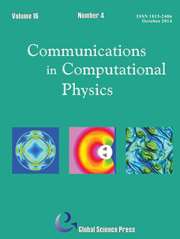Article contents
Micro-Differential Boundary Conditions Modelling the Absorption of Acoustic Waves by 2D Arbitrarily-Shaped Convex Surfaces
Published online by Cambridge University Press: 20 August 2015
Abstract
We propose a new Absorbing Boundary Condition (ABC) for the acoustic wave equation which is derived from a micro-local diagonalization process formerly defined by M.E. Taylor and which does not depend on the geometry of the surface bearing the ABC. By considering the principal symbol of the wave equation both in the hyperbolic and the elliptic regions, we show that a second-order ABC can be constructed as the combination of an existing first-order ABC and a Fourier-Robin condition. We compare the new ABC with other ABCs and we show that it performs well in simple configurations and that it improves the accuracy of the numerical solution without increasing the computational burden.
Keywords
Information
- Type
- Research Article
- Information
- Copyright
- Copyright © Global Science Press Limited 2012
References
- 8
- Cited by

